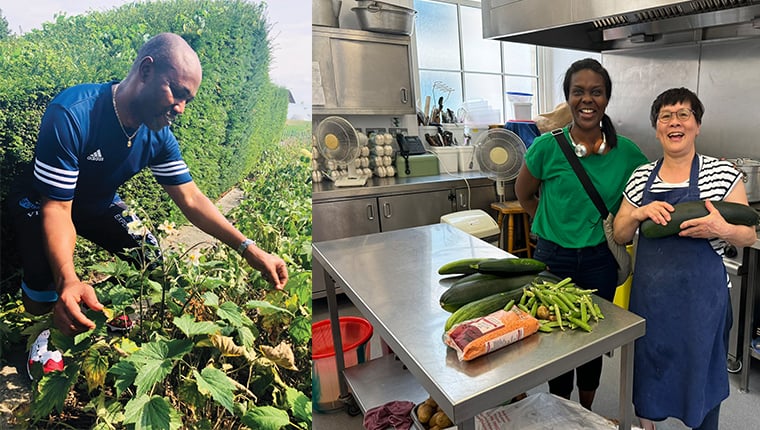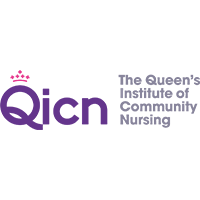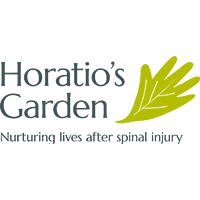Projects led by Community Nurses will improve Health and Wellbeing

The Queen’s Institute of Community Nursing (QICN) has announced the latest group of nurse-led innovation projects to receive funding.
The projects are all led by community nurses in various specialisms and will focus on the potential of gardens to improve the physical and/or mental health of a particular group of people. Each of the projects will benefit from up to £5000 in funding from the National Garden Scheme, and a year-long programme of support from the QICN.
The five projects are part of the NGS Elsie Wagg Innovation Scholarships, supported by the National Garden Scheme, and are part of the QICN’s wider Community Nurse Innovation Programme.
Dr Amanda Young, the QICN’s Director of Nursing (Innovation and Policy) said: “The competition for this year’s programme was very strong, with nearly 30 applications for the five funded places. This shows just how important this programme has become, and the appetite among community nurses to improve people’s health in a sustainable and imaginative way. The QICN is perfectly placed to bring these nurses together and to nurture their ideas with a year-long programme of expert support.”
The shortlisted projects were interviewed online by the QICN and the National Garden Scheme but most of the programme is delivered in person face-to-face: the QICN also organises site visits to all the projects during the year.
A launch workshop was held in London in March 2025 and the gardens and health projects are being delivered alongside two nurse-led diabetes projects funded by the Burdett Trust, using the same overarching principles to achieve success.
The Elsie Wagg Scholarships are named for the QICN Council member whose inspiration led to the creation of the National Garden Scheme in 1927.
Final reports of all the projects will be presented early in 2026.
A summary of the five NGS Elsie Wagg Innovation Projects is given below.
The Circle Garden Haven
Leader – Kathy Pelc, Sutton Health and Care
“As we know, spending time in nature and in a garden, and with other people, has a positive impact on our physical and mental health. My project aims to bring mothers and their babies together in a group within the garden of the local library, where mothers are experiencing mild to moderate depression or anxiety. Through meeting weekly and developing the garden area it is hoped that this will bring about a positive change to their mental health and wellbeing. It will also support the local environment and would be a haven for staff and the general public.”
Twinwoods Sensory Garden
Leader – Simone Mingay, East London NHS Foundation Trust
“Outside wheelchair accessible space for our clients and staff. (Presently neither group can access being outside comfortably as there is nowhere to sit.) Our clients have high sensory needs; they will be able to experience a sensory pathway providing a range of smells, textures, colours and underfoot variation. We will create an area for workshops outdoors for art and nature projects. The workshops will aid health and well-being by providing access to fresh air, colour and a range of sensory experiences. A sense of achievement inducing increased well-being, will come from producing sustainable art for this space.”
Using Nature to make Connections
Leader – Claire Norman, Ty Llidiard, Princess of Wales Hospital, Bridgend, Wales
“The project will bring together service users within the Specialised Services directorate to support their emotional health and wellbeing. The directorate consists of teams from Early Intervention Psychosis, Integrated Autism Service, Eating Disorder, Perinatal and Veterans Service. Through collaboration of these diverse groups, we will reduce feelings of isolation, promote skill development, ultimately boosting confidence and self-esteem. The refurbishment of the gardens within the hospital setting will provide a therapeutic space for all users, encouraging relaxation and social interaction. The aim is this will provide a sense of connection among participants.”
Supporting Women with Horticulture
Leader – Emma Beniston, HMP Styal, Cheshire
“Within HMP Styal over 90% of the population enter the prison with primary care level anxiety and depression, we have developed the social prescribing pathway to offer complementary and also alternative routes to prescribed medication where appropriate. The social prescribing pathway refers our Women to a horticulture programme where they can grow home grown vegetables, take part in flower planting/arranging and other mindful activities with nature at the centre of the pathway as we know how much nature can influence an individual’s mental and as a result overall physical health. This will also support patients in prison experiencing menopause.”
Gardening For Growth
Leader – Linda Antunes, Bridge House, Stockton-on-Tees
“We have numerous goals for this project, because we believe that it could be incredibly transformative for our residents. In the first instance, we hope to improve our residents’ mental health, by reducing isolation, encouraging ownership, and increasing their exposure to nature. We also hope that by getting them involved in gardening, we can improve their physical health, because they will be doing both cardio and strength exercise. In addition to the health improvements for those directly involved in the project, we also hope to create outdoor spaces that will improve the health and wellbeing of future residents.”
For more on the scholarships and National Garden Scheme support of QICN – click here

















